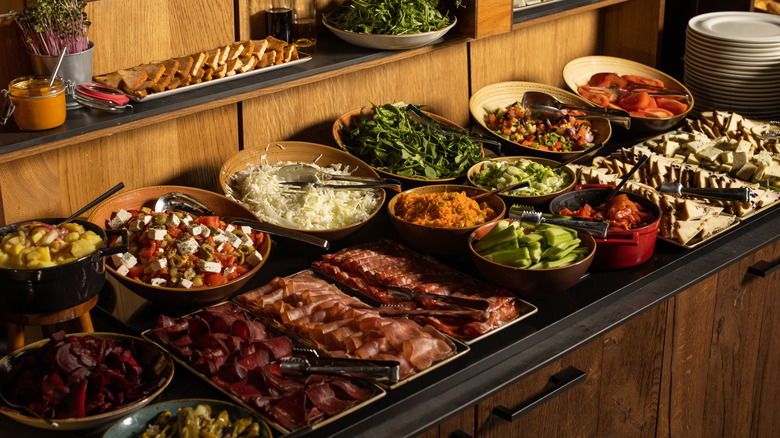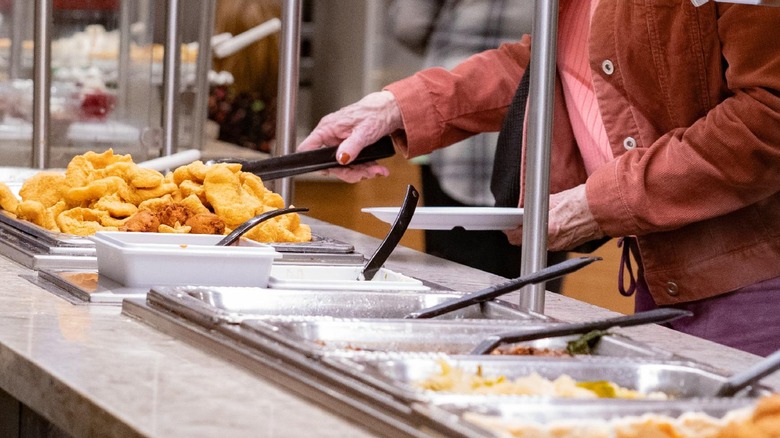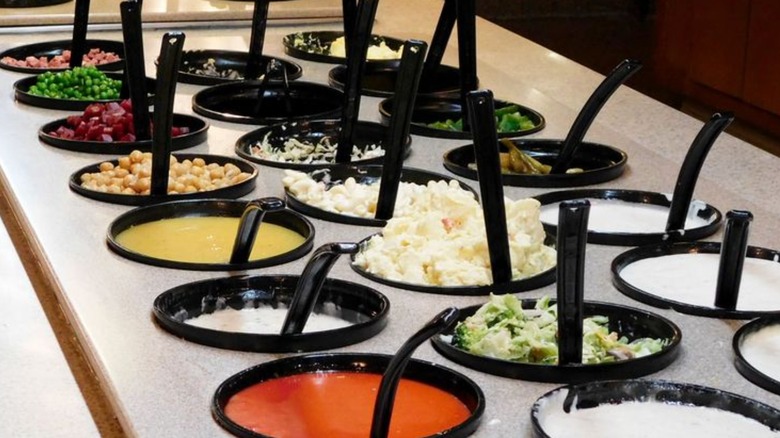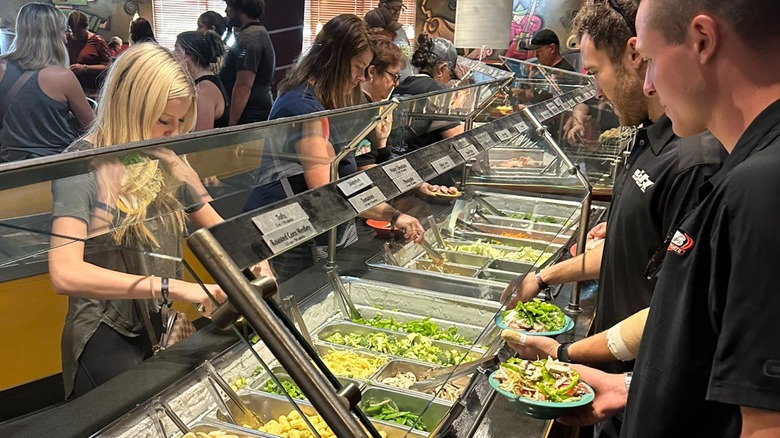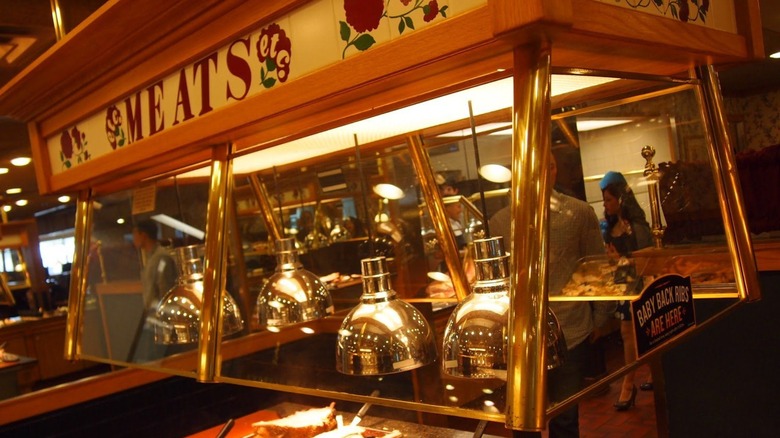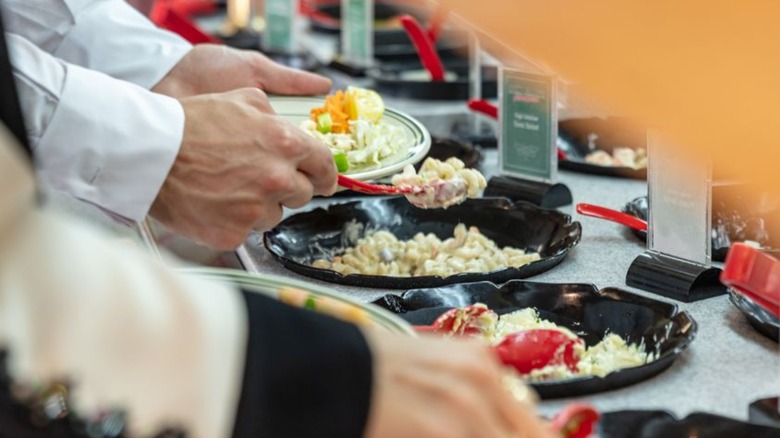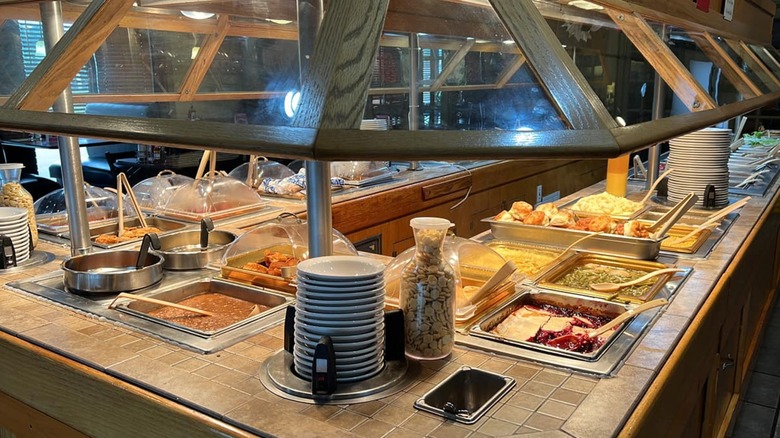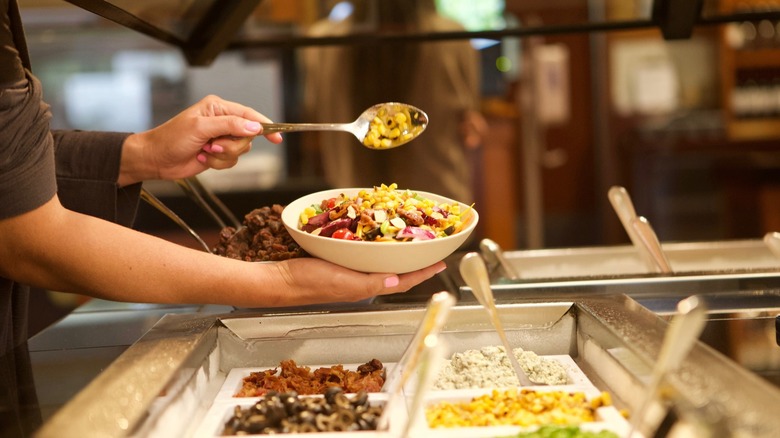12 Big Scandals That Rocked Buffet Restaurant Chains
The scandals that surround buffet restaurant chains aren't all necessarily what you'd expect. Considering how much buffet food gets handled by so many people and kept at dubious temperatures, you'd expect all the scandals to be related to food poisoning. While several are, that probably could have happened to any restaurant unlucky enough to have received tainted food products. Other scandals at buffet restaurant chains range from sexual abuse and workplace discrimination to underage alcohol sales and even a mass murder.
Despite all the scandals, financial struggles that led to bankruptcies, and the devastating effects that COVID-19 had on buffets, all of the restaurants on this list still exist in some form. Nothing seems to keep people away from buffets forever. However, most have far fewer locations than they did in their heyday, and one now exists only outside the U.S. Let's take a deeper look at the scandals that have rocked the world of buffet chain restaurants and what has come from them.
Chi-Chi's hepatitis A outbreak
Chi-Chi's 2003 hepatitis A outbreak was one of the biggest restaurant scandals ever. Over 650 people who ate at a Pennsylvania Chi-Chi's Mexican buffet that fall or who were connected to people who ate there ended up sick. In total, 9,000 people received immune globulin injections to stave off possible infection. However, the real tragedy was that four people died, and one person ended up needing a liver transplant.
According to the Centers for Disease Control and Prevention, you can get hepatitis A from eating food or drinking beverages with even tiny amounts of the virus in them. It also can spread easily from close contact with someone who has hepatitis A. At Chi-Chi's, the contaminated food turned out to be from infected raw green onions that the chain had sourced from Mexico. Those who didn't die from the outbreak likely experienced a couple of months of feeling tired and having an upset stomach. They may also have had their skin and eyes turn yellowish with jaundice since the virus affects the liver.
The chain was already struggling financially, having filed for bankruptcy before the devastating hepatitis A outbreak. Per a court order, it paid more than $40 million in damages stemming from hundreds of lawsuits over the outbreak. Chi-Chi's tried suing the company that supplied the tainted green onions, Castellini, but was unsuccessful. Chi-Chi's never really recovered from the outbreak in the U.S., and the only remaining locations are now overseas.
Golden Corral's hidden meat during inspections
In July 2013, an employee at the Golden Corral in Port Orange, Florida, posted a YouTube video supposedly highlighting what the chain did when an inspector came around. Brandon Huber's video shows restaurant-grade trays of raw hamburger patties and baby-back ribs that the manager asked employees to take outside to avoid a bad inspection score. The wheeled rack full of meat trays is covered with a heavy plastic sheet and sitting beside the trash bin. Flies had already descended on the meat in the sweltering summer heat. Removing possibly tainted meat during an inspection is one thing. However, Huber told WKMG-TV News 6 that "after the inspectors left, they wheeled it back into the restaurant, and they tried to put it back into the coolers. They wanted me to cook it, and I refused to."
Eric Holm, the owner of the Golden Corral franchise in question, issued an official statement saying that none of the food near the Dumpster was served to diners. Instead it was destroyed. Holm further said that Huber helped with the disposal process. Huber didn't actually release the videos until the day after he was part of the meat disposal. Holm also said that he fired the manager who asked employees to remove the meat during the surprise inspection. No matter what exactly happened, customers told News 6 that they didn't want to eat at Golden Corral if there was a chance of potentially getting unsafe food.
Hoss's Steak and Sea House Barbie sacrifice and sexual harassment incident
It was 1995 when two fired waitresses filed a civil suit against Hoss's Steak and Sea House, claiming to have worked in an aggressive and uncomfortable environment. One claim involved an employee mutilating, skewering, and deep-frying a Barbie doll in what the waitresses said was a satanic ritual. Employees continued to use the grease to fry food for another week, according to the suit as reported by the Pittsburgh Post-Gazette. The waitresses also outlined instances of sexual harassment, where some employees would touch them and others inappropriately. Additionally, some employees would taunt the ladies by recounting explicit details of sexual encounters, making overt sexual remarks, and playing music with explicit sexual content to try to agitate them, the suit claimed.
After the two complained to management about what was happening to them, they said they became the victims of retaliation. Suddenly, they started getting scheduled for the worst shifts when the restaurant didn't have many customers or getting bad food to serve to the customers (undercooked or with bugs), both of which cut into their ability to earn tips. After being fired in 1994, both waitresses said that they couldn't get new jobs because Hoss's employees were giving them bad references. Federal jurors ultimately rejected the claims at a 1998 trial, siding instead with the restaurant company.
HuHot's credit-card skimming employee
Over the years, we've gotten used to handing over our credit cards and debit cards when we pay for something. However, any time that you let your card out of your sight, you put yourself at risk for what happened at a Sheridan, Colorado, HuHot. In 2014, police reported arresting Michael Stephens for credit card skimming at the HuHot Mongolian barbecue grill where he worked.
He might have gotten away with it for longer if he hadn't decided to brag to a fellow employee about what he was doing and show her his skimming machine. She didn't find it as amusing as he thought she would, and she promptly reported the crime. When the police started investigating, they also found several gift cards with the card skimmer. Their theory is that, instead of leaving a trail of purchases from the stolen card numbers, Stephens had used information from them to purchase gift cards. Then, he used the gift cards in place of cash to make purchases.
Overall, the FBI estimates that card-skimming thieves end up stealing $1 billion per year. However, a lot of these thefts happen without releasing your card to anyone. Instead, a thief may attach a skimmer device on top of a legitimate card reader at a gas pump or ATM terminal. So, you don't have to hand off your card to end up the victim of a skimming scheme.
Ryan's Family Steakhouse's workplace discrimination lawsuits
Ryan's Family Steakhouse had a history of workplace discrimination lawsuits. In a court-dismissed case from 2000, a black employee named Dwayne Campbell alleged that he was passed up to become manager in favor of a lower-ranked white employee. In a 2006 court-dismissed case, another black employee, Elvis Jenkins, said he was fired for a situation related to wearing jeans to work instead of the required work pants, an infraction that white employees regularly got away, according to the suit. He also alleged retaliation after his brother made a racial discrimination complaint against Ryan's as a customer.
It wasn't until 2009 that claims by several Ryan's employees who alleged sexual and racial discrimination were upheld. Seven employees in Kentucky collectively received $500,000 in a settlement through a U.S. Equal Employment Opportunity Commission consent decree after filing a class action lawsuit. If you were a female employee, a black employee, or a while employee associated with black employees, other workers at Ryan's made your life miserable. Black employees were regularly subjected to racial hostilities and fired, friends of black employees were called "race traitors" and worse, and women were subjected to sexual harassment of all sorts. If you visited a Ryan's buffet after the decree, you may have seen a court-ordered notice on display stating that employees would no longer be engaging in sexual and racial harassment and that they wouldn't be retaliating against anyone who reported problems.
Old Country Buffet's salmonella outbreaks
You probably haven't seen many Old Country Buffets these days, which could be partially related to its reputation being ruined by salmonella outbreaks (plural). In 2010, a man named Christopher Gage suffered severe side effects from salmonella poisoning that had been traced to his visit to an Old Country Buffet in Wyoming. His body responded to the salmonella infection with sepsis, and his kidneys failed, among other issues. He ended up with debilitating injuries related to digestion, mobility, and brain function. Ultimately, he was awarded a $11.4 million judgment that was helped by the fact that the restaurant had been written up just the day before Gage ate there for 18 health code infractions it obviously didn't fix.
In 2014, salmonella struck again at an Old Country Buffet in Minnesota. This time, it sickened 36 people over several days, one of whom ended up in the hospital. Ultimately, the source of the outbreak turned out to be dinner rolls, which healthy authorities think were probably contaminated with salmonella from raw chicken in the kitchen.
In 2016, Old Country Buffet filed for its third bankruptcy, which was related to the $11.4 million judgment awarded in 2015 from the 2010 salmonella case. The chain also started to see a decline in sales, which was likely because of the ick factor related to going to a buffet that had such a big salmonella outbreak recently.
Peter Piper Pizza's underage alcohol sales
We found it somewhat fitting that a chain named after a stranger in a fairy tale who lured children away from their parents with his flute ended up serving alcohol to underage kids. And it wasn't just in one state or one year. The Texas Alcoholic Beverage Commission (TABC) investigated Peter Piper Pizza in 2019 after receiving a tip that alcohol had been sold to a minor. The investigation was closed for lack of video evidence. However, the police and sheriff's officials in Cochise County, Arizona, went a different route to combat underage alcohol sales. They sent undercover teen volunteers to dozens of places to attempt to buy alcohol. The teens' ID cards clearly showed that they were underage, but some employees sold alcohol to them anyway. Peter Piper's Pizza was among four business cited for selling alcohol to undercover teens during the June 2014 operation.
There seems to have been improvements at Peter Piper Pizza. In 2019, a 23-year-old in Pleasanton, Texas, posted on Reddit that they couldn't buy alcohol because the cashier saw that they still had a vertical driver's license issued from before they turned 21 rather than the horizontal license issued after they reach legal age. And in 2020, Peter Piper Pizza and other pizza restaurants in Yavapai County, Arizona, agreed to hand out flyers in their restaurants discouraging underage drinking. Being proactive is definitely a step in the right direction.
Pizza Ranch's sexual abuse scandal
The Pizza Ranch sexual abuse scandal involved several young male employees and their boss. According to court filings with details of the case, Pizza Ranch co-owner Lawrence Vander Esch told some of his teenage employees that he would pay them for semen samples for scientific research. Only there was a catch. The teens would need to ensure that there was no air in the sample, so they'd need to collect it in a condom. And Vander Esch insisted he needed to help them to get the proper sample collection. He placed the samples on ice to reinforce the research story. One of the young men even traveled with Vander Esch to the University of Iowa Hospitals where he claimed he had to "deliver" a sample, records showed. Of course, it was all a ruse.
During the criminal investigation more than a dozen former employees alleged similar abuse by the businessman over a 20-year period, according to the Sioux City Journal. Vander Esch pleaded guilty in 2001 to four counts of third-degree sexual abuse. He then appealed his conviction, claiming he wasn't at fault because he got permission from each of his victims, even if the teens granted that permission under false pretenses. He was sentenced to prison for 10 years and served almost five years before being released for good behavior, according to the newspaper. In 2006 a judge vacated his convictions, citing a change in the law by the Iowa Supreme Court.
Ponderosa Steakhouse's check kiting scandal
If you're not familiar with check kiting, it involves writing bad checks from one bank account to increase the size of another bank account. If you have enough accounts, you could artificially inflate the size of each one so that it seems like you have real money ... until someone catches onto your scheme.
Fred Boukzam owned 15 Ponderosa Steakhouses when he was caught in one of the biggest check-kiting schemes to ever hit northern Ohio. He was writing checks from each of his 15 Ponderosa Steakhouse accounts to pass around bogus money totaling about $824 million, according to the Akron Beacon Journal. The scheme lasted for 21 months before FirstMerit Bank realized it was losing millions from the check-kiting game Boukzam had been playing. Over 44,000 checks were involved, with the number of checks increasing to over 300 a day.
Boukzam pleaded guilty in 2008 and ended up with a 33-month prison sentence, according to the Akron Beacon Journal. When you're cashing $4.9 million to $4.25 million in checks a day, it gets a little too big to deny. Nine of his 15 restaurants closed. However, the owners of two of the buildings that Boukzam leased for his restaurants opened new buffets, changing the name to Christine's Home Buffet and Grill and serving higher-quality food. You can still find Ponderosa Steakhouses in various parts of the country, but the brand doesn't have nearly the presence it once did.
Shoney's racial discrimination
You know a scandal is bad when it has a book written about it. "The Black O: Racism and Redemption in an American Corporate Empire" by Steve Watkins tells the story of Shoney's racial discrimination problems. The "black O," according to a summary of the book, refers to the practice the company had of filling in the "O" in "Shoney's" on employment applications to indicate that it belonged to a minority and should be filed in the trash can.
A 1989 complaint in Pensacola, Florida, referenced evidence against 211 managers and other top figures who followed these and other discriminatory practices, according to the Washington Post. However, some managers protested this practice and enough other instances of racial discrimination came to light to warrant a civil lawsuit against the chain. Black employees spoke of working for the chain for years without promotions, being forced to work out of sight in the kitchen, or being fired for racially related reasons.
Ultimately, about 40,000 employees, former employees and job applicants benefitted from the $105 million settlement that cost the company $132.5 million once legal fees and court costs were factored in, according to Greensboro News & Record. This was a landmark win in the fight against racism in restaurants.
Sirloin Stockade's mass murder
Nothing ruins your appetite for a restaurant buffet like knowing that a mass murder took place there. The slayings at an Oklahoma City Sirloin Stockade happened in 1978, but the memory of the case has lingered for decades since mass murders were so rare at that time — this was Oklahoma's first, according to KFOR-TV. Four of the six employees killed were teenagers between the ages of 15 and 17. That night, Roger Dale Stafford, his wife, Verna May Stafford, and his brother, Harold Stafford, ordered the workers into the meat freezer, where they subsequently shot them in the head at close range, killing them.
Police initially had no suspects. The trio would likely have gotten away with the crime if Roger Stafford hadn't drunk-dialed the Oklahoma State Bureau of Investigation in 1979 to accuse his brother and then-estranged wife of being responsible, according to The Oklahoman. Officials learned that Harold Stafford had died in a motorcycle accident a week after the murders. It turned out that the gun they used at Sirloin Stockade was the same one they used to kill a family of three in Purcell, Oklahoma, 24 days earlier. Ultimately, Roger Stafford was sentenced to death while Verna Stafford got two consecutive life sentences. The murder cases have their own true-crime account in paperback called "Sirloin Stockade Slaughter: Murder on the Run."
Sizzler's E. coli outbreak
The E. coli outbreak at two Sizzler restaurants in Wisconsin in the summer of 2000 sickened hundreds of people, hospitalized dozens, and ultimately claimed the life of a 3-year-old girl, which is what makes this case so tragic. Four people (including the toddler who died), contracted hemolytic uremic syndrome (HUS), which destroys red blood cells and causes the kidneys to shut down, with kids under age 5 and people with compromised immunities being most susceptible, according to the New York Department of Health.
When officials tested the E. coli from the two restaurants, they were genetically related, which means that the bacteria found at both locations came from the same source. Ultimately, officials traced the source to raw taco meat and raw sirloin tri-tips, which had contaminated items on the buffet salad bar. One of the main culprits seemed to be the watermelon, which is ever so tempting for young buffet-goers.
It took 12 years for a lawsuit between Sizzler and its meat supplier, Excel, assigning liability for the outbreak to be resolved, according to Food Safety News. Jurors found that Excel was 80% responsible for the outbreak while the remaining 20% went to the restaurant's management company. Multiple lawsuits filed by people who got sick as well as the family of the toddler who died had been previously settled. Sizzler also paid medical bills for anyone who got sick. The outbreak was estimated to cost Excel about $35 million, Food Safety News reported.
